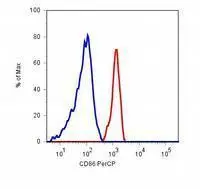![FACS analysis of Ramos cells using GTX02615 CD86 antibody [C86/2160R]. Blue : Primary antibody Red : Isotype control FACS analysis of Ramos cells using GTX02615 CD86 antibody [C86/2160R]. Blue : Primary antibody Red : Isotype control](https://www.genetex.com/upload/website/prouct_img/normal/GTX02615/GTX02615_20210319_FACS_w_23053122_896.webp)
FACS analysis of Ramos cells using GTX02615 CD86 antibody [C86/2160R]. Blue : Primary antibody Red : Isotype control
CD86 antibody [C86/2160R]
GTX02615
ApplicationsFlow Cytometry, ImmunoFluorescence, Western Blot, ELISA, ImmunoCytoChemistry, ImmunoHistoChemistry, ImmunoHistoChemistry Paraffin
Product group Antibodies
TargetCD86
Overview
- SupplierGeneTex
- Product NameCD86 antibody [C86/2160R]
- Delivery Days Customer9
- Application Supplier NoteWB: 1-2 microg/ml. ICC/IF: 1-2 microg/ml. IHC-P: 1-2 microg/ml. FACS: 1-2 microg/million cells. ELISA: 2-4 microg/ml (for coating). *Optimal dilutions/concentrations should be determined by the researcher.Not tested in other applications.
- ApplicationsFlow Cytometry, ImmunoFluorescence, Western Blot, ELISA, ImmunoCytoChemistry, ImmunoHistoChemistry, ImmunoHistoChemistry Paraffin
- CertificationResearch Use Only
- ClonalityMonoclonal
- Clone IDC86/2160R
- Concentration200 ug/ml
- ConjugateUnconjugated
- Gene ID942
- Target nameCD86
- Target descriptionCD86 molecule
- Target synonymsB7.2; B70; B7-2; B-lymphocyte activation antigen B7-2; BU63; CD28LG2; CD86 antigen (CD28 antigen ligand 2, B7-2 antigen); CTLA-4 counter-receptor B7.2; FUN-1; LAB72; T-lymphocyte activation antigen CD86
- HostRabbit
- IsotypeIgG
- Protein IDP42081
- Protein NameT-lymphocyte activation antigen CD86
- Scientific DescriptionThis gene encodes a type I membrane protein that is a member of the immunoglobulin superfamily. This protein is expressed by antigen-presenting cells, and it is the ligand for two proteins at the cell surface of T cells, CD28 antigen and cytotoxic T-lymphocyte-associated protein 4. Binding of this protein with CD28 antigen is a costimulatory signal for activation of the T-cell. Binding of this protein with cytotoxic T-lymphocyte-associated protein 4 negatively regulates T-cell activation and diminishes the immune response. Alternative splicing results in several transcript variants encoding different isoforms.[provided by RefSeq, May 2011]
- Storage Instruction2°C to 8°C
- UNSPSC12352203

![ICC/IF analysis of Raji cells using GTX02615 CD86 antibody [C86/2160R]. Green : Primary antibody Red : nuclear counterstain ICC/IF analysis of Raji cells using GTX02615 CD86 antibody [C86/2160R]. Green : Primary antibody Red : nuclear counterstain](https://www.genetex.com/upload/website/prouct_img/normal/GTX02615/GTX02615_20210319_ICCIF_w_23053122_178.webp)
![IHC-P analysis of human colon tissue section using GTX02615 CD86 antibody [C86/2160R]. IHC-P analysis of human colon tissue section using GTX02615 CD86 antibody [C86/2160R].](https://www.genetex.com/upload/website/prouct_img/normal/GTX02615/GTX02615_20210319_IHC-P_w_23053122_314.webp)
![WB analysis of Ramos whole cell lysate using GTX02615 CD86 antibody [C86/2160R]. WB analysis of Ramos whole cell lysate using GTX02615 CD86 antibody [C86/2160R].](https://www.genetex.com/upload/website/prouct_img/normal/GTX02615/GTX02615_20210319_WB_w_23053122_948.webp)

![FACS analysis of human peripheral blood using GTX80210 CD86 antibody [BU63] (APC).](https://www.genetex.com/upload/website/prouct_img/normal/GTX80210/GTX80210_20191025_AP_006_424_w_23061322_738.webp)

![ICC/IF analysis of Raji cells using GTX34569 CD86 antibody [C86/1146]. Green : Primary antibody Red : nucleus](https://www.genetex.com/upload/website/prouct_img/normal/GTX34569/GTX34569_20200115_ICC-IF_1795_w_23060801_423.webp)